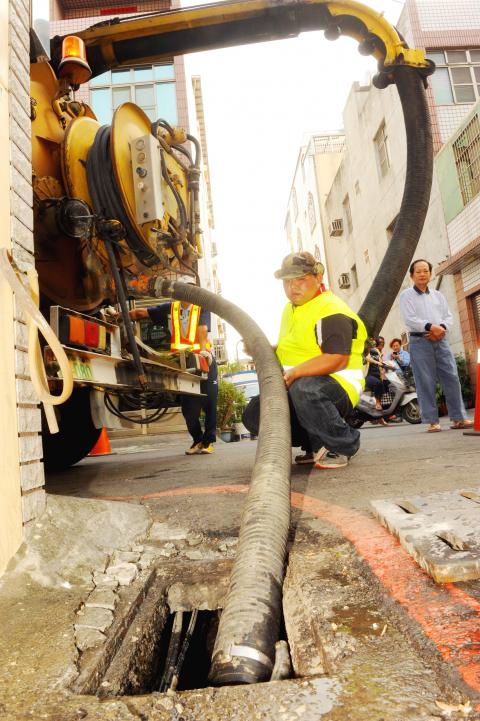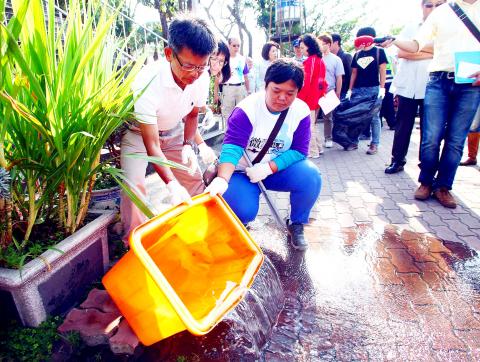An experimental program run by the Greater Kaohsiung Government in its battle against dengue fever that uses seawater to flood drainage pipes appears to have been a success, city health officials said yesterday.
The city’s Department of Health said almost all of the 200 larvae of Aedes aegypti mosquito, the main carrier of the dengue virus, died in less than 12 hours after being immersed in seawater-filled drains.
Kaohsiung is battling the worst outbreak of the disease in recent memory, with 10,138 confirmed cases in the city, out of the 10,600 nationwide this year.

Photo: Chang Chung-yi, Taipei Times
“To prevent more mosquito larvae from breeding in drains during the dry season, the department recently began an experimental program to curb the mosquitoes’ rampant growth by pouring seawater down the drains,” Disease Prevention Division section head Ho Hui-pin (何惠彬) said.
In the first stage of the experiment, the department drew seawater samples from five ports, including the ferry station and the coast guard post in Cijin District (旗津), the Cianjhen and Gushan fishing ports and Sizihwan Bay (西子灣).
The samples had an average salinity of 30.5 practical salinity units (psu). Twenty mosquito larvae placed in a shallow container with the samples died within three hours, Ho said.

Photo: CNA
The samples were then diluted with water to about 15 psu, before being poured into five shallow containers that each held 20 larvae, Ho said, adding that all of the larvae died within 24 hours.
“The department then put 200 larvae in 10 nets made out of silk stockings and immersed them in two seawater-filled drains in Sanmin District’s (三民) Benguan Borough (本館), which has been the most severely affected area in the outbreak,” Ho said.
Only three larvae were still alive as of 9am yesterday, which met expectations, he said.
“For the next stage, we will pour seawater into 400m of drains in Sanmin District,” Ho said.
Centers for Disease Control Deputy Director-General Chou Jih-haw (周志浩) said he had only read about such a preventive approach in research papers and had never seen it being applied in real life.
“Soaking mosquito larvae in high-density seawater for an extended period has been proven to be an effective mosquito-killing method in lab experiments. The agency will stay in close touch with Kaohsiung’s health department,” Chou said.
Meanwhile, Chinese Nationalist Party (KMT) Greater Kaohsiung mayoral candidate Yang Chiu-hsing (楊秋興) lambasted the seawater plan as “ludicrous.”
The only effective way to contain the spread of the disease is by eliminating the environments where vector mosquitoes breed, the candidate said.
He said that with cases of people contracting dengue soaring, the municipality has suffered a major setback in its efforts to combat the disease, but Greater Kaohsiung Mayor Chen Chu (陳菊) continues to keep busy by attending opening ceremonies.
Additional reporting by Sean Lin

DAREDEVIL: Honnold said it had always been a dream of his to climb Taipei 101, while a Netflix producer said the skyscraper was ‘a real icon of this country’ US climber Alex Honnold yesterday took on Taiwan’s tallest building, becoming the first person to scale Taipei 101 without a rope, harness or safety net. Hundreds of spectators gathered at the base of the 101-story skyscraper to watch Honnold, 40, embark on his daredevil feat, which was also broadcast live on Netflix. Dressed in a red T-shirt and yellow custom-made climbing shoes, Honnold swiftly moved up the southeast face of the glass and steel building. At one point, he stepped onto a platform midway up to wave down at fans and onlookers who were taking photos. People watching from inside

A Vietnamese migrant worker yesterday won NT$12 million (US$379,627) on a Lunar New Year scratch card in Kaohsiung as part of Taiwan Lottery Co’s (台灣彩券) “NT$12 Million Grand Fortune” (1200萬大吉利) game. The man was the first top-prize winner of the new game launched on Jan. 6 to mark the Lunar New Year. Three Vietnamese migrant workers visited a Taiwan Lottery shop on Xinyue Street in Kaohsiung’s Gangshan District (崗山), a store representative said. The player bought multiple tickets and, after winning nothing, held the final lottery ticket in one hand and rubbed the store’s statue of the Maitreya Buddha’s belly with the other,

‘NATO-PLUS’: ‘Our strategic partners in the Indo-Pacific are facing increasing aggression by the Chinese Communist Party,’ US Representative Rob Wittman said The US House of Representatives on Monday released its version of the Consolidated Appropriations Act, which includes US$1.15 billion to support security cooperation with Taiwan. The omnibus act, covering US$1.2 trillion of spending, allocates US$1 billion for the Taiwan Security Cooperation Initiative, as well as US$150 million for the replacement of defense articles and reimbursement of defense services provided to Taiwan. The fund allocations were based on the US National Defense Authorization Act for fiscal 2026 that was passed by the US Congress last month and authorized up to US$1 billion to the US Defense Security Cooperation Agency in support of the

‘COMMITTED TO DETERRENCE’: Washington would stand by its allies, but it can only help as much as countries help themselves, Raymond Greene said The US is committed to deterrence in the first island chain, but it should not bear the burden alone, as “freedom is not free,” American Institute in Taiwan Director Raymond Greene said in a speech at the Institute for National Defense and Security Research’s “Strengthening Resilience: Defense as the Engine of Development” seminar in Taipei yesterday. In the speech, titled “Investing Together and a Secure and Prosperous Future,” Greene highlighted the contributions of US President Donald Trump’s administration to Taiwan’s defense efforts, including the establishment of supply chains for drones and autonomous systems, offers of security assistance and the expansion of